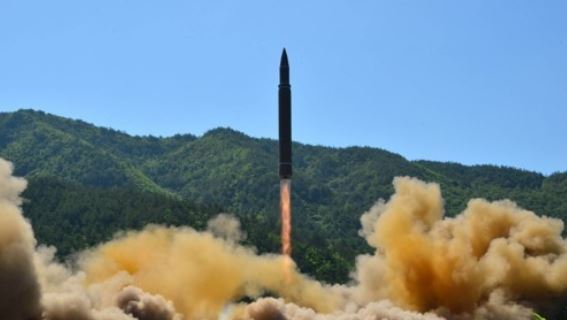After turbulent six months, Moon's peace vision faces real test
By YonhapPublished : Nov. 10, 2017 - 13:23
From North Korea's belligerence to a stand-off with China over the THAAD missile defense system, the Moon Jae-in administration's first six months were marked by immense diplomatic and security challenges.
The left-leaning president took office on May 10 with a pledge to bring peace to the divided peninsula and promote Seoul's "balanced" diplomacy.
Four days after his inauguration, however, the North test-fired a Hwasong-12 intermediate-range ballistic missile into the East Sea.
It was considered a slap in the face to Moon, who has sought a speedy improvement in inter-Korean ties despite criticism from many conservatives here.
The North has since launched nine more ballistic missiles of various types, including the Hwasong-14 intercontinental ballistic missile.
It even carried out a sixth nuclear test on Sept. 3, although it has refrained from engaging in additional provocative acts since mid-September.

The series of provocations suggested the quickening pace of the North's nuclear and missile development.
Pyongyang threatened to fire missiles toward Guam and press ahead with a hydrogen bomb test over the Pacific Ocean. The US repeatedly stated that all options, including military ones, are on the table.
President Donald Trump warned that the North will face "fire and fury" and it will be "totally" destroyed in case of an attack.
Some described the situation as the worst-ever crisis on the peninsula since the 1950-53 Korean War.
Moon's peace initiative, specified in his Berlin speech on July 6, was overshadowed by the heightened tensions.
Pyongyang ignored Seoul's subsequent offer of military talks on easing border tensions and resuming separated family reunions.
With a breakthrough elusive in efforts to improve inter-Korean ties, public concern mounted that the South may be dragged into a war prompted by a US pre-emptive strike on the North. Moon made it clear that there should be no war on the peninsula.
Doubts grew over Moon's push for South Korea to get in "the driver's seat" in handling North Korea affairs.
Opposition parties accused him of being "too naive," arguing that South Korea is being sidelined by regional powers when it comes to the North Korea issue, which critics call "Korea Passing."
They labeled Moon's national security team as incompetent.
Refuting the claim, Moon's national security advisor Chung Eui-yong recently told lawmakers that the current administration has "inherited the worst diplomatic and security circumstances from the previous government."
A silver lining is a clear signal that South Korea and the US are maintaining a robust alliance under the Moon and Trump administrations.
They had three summit talks, which include the latest in Seoul earlier this week. Speaking with a single voice about North Korea, they appear to have forged a relatively good personal relationship as well.
In a joint press conference with Moon on Tuesday, Trump said South Korea is "very important to me. And there will be no skipping South Korea... Plus, I've developed great friendships, not only with the President but with others."
Moon reaffirmed that his diplomatic approaches are not about balancing between Washington and Beijing but wants to expand and diversify Seoul's diplomatic ground for peace and stability in Northeast Asia.
Late last month, South Korea also reached a deal with China to mend ties strained by their THAAD row for more than a year.
Moon is scheduled to hold a summit with Chinese President Xi Jinping in Vietnam this weekend on the margins of the Asia-Pacific Economic Cooperation meeting.
"Both sides shared the view that the strengthening of exchange and cooperation between Korea and China serves their common interests and agreed to expeditiously bring exchange and cooperation in all areas back on a normal development track,” Seoul's foreign ministry said in a statement.
Foreign Minister Kang Kyung-wha announced separately that her government won't seek any more deployments of the THAAD system. She also assured that the South will not join the US missile defense networks nor seek a trilateral alliance involving Japan.
The so-called three-no principle drew mixed responses at home. Some said it was a realistic decision intended to move forward Seoul-Beijing ties, while others said it was nothing more than a "humiliating" statement to curry favor with Beijing over Seoul's sovereign rights.
Even if the Moon government has yet to address disputes with Japan over its sexual enslavement of Korean women during World War II, the neighboring countries are working together to deal with North Korea.
In that sense, Moon has effectively laid the groundwork for his full-fledged peace drive for the remainder of his five-year tenure, having focused so far on crisis management and a resolution to some diplomatic problems left by the previous Park Geun-hye administration.
He's now bracing for a real test on his peace vision, the key to success as the country's first liberal president in a decade.
If the North participates in the PyeongChang Winter Olympics to open early next year in the eastern town of the South, it would provide momentum to his initiative. (Yonhap)


![[AtoZ into Korean mind] Humor in Korea: Navigating the line between what's funny and not](http://res.heraldm.com/phpwas/restmb_idxmake.php?idx=644&simg=/content/image/2024/04/22/20240422050642_0.jpg&u=)


![[Exclusive] Korean military set to ban iPhones over 'security' concerns](http://res.heraldm.com/phpwas/restmb_idxmake.php?idx=644&simg=/content/image/2024/04/23/20240423050599_0.jpg&u=20240423183955)
![[Herald Interview] Why Toss invited hackers to penetrate its system](http://res.heraldm.com/phpwas/restmb_idxmake.php?idx=644&simg=/content/image/2024/04/22/20240422050569_0.jpg&u=20240422150649)
![[Graphic News] 77% of young Koreans still financially dependent](http://res.heraldm.com/phpwas/restmb_idxmake.php?idx=644&simg=/content/image/2024/04/22/20240422050762_0.gif&u=)







![[Exclusive] Korean military to ban iPhones over security issues](http://res.heraldm.com/phpwas/restmb_idxmake.php?idx=652&simg=/content/image/2024/04/23/20240423050599_0.jpg&u=20240423183955)



![[Today’s K-pop] Ateez confirms US tour details](http://res.heraldm.com/phpwas/restmb_idxmake.php?idx=642&simg=/content/image/2024/04/23/20240423050700_0.jpg&u=)